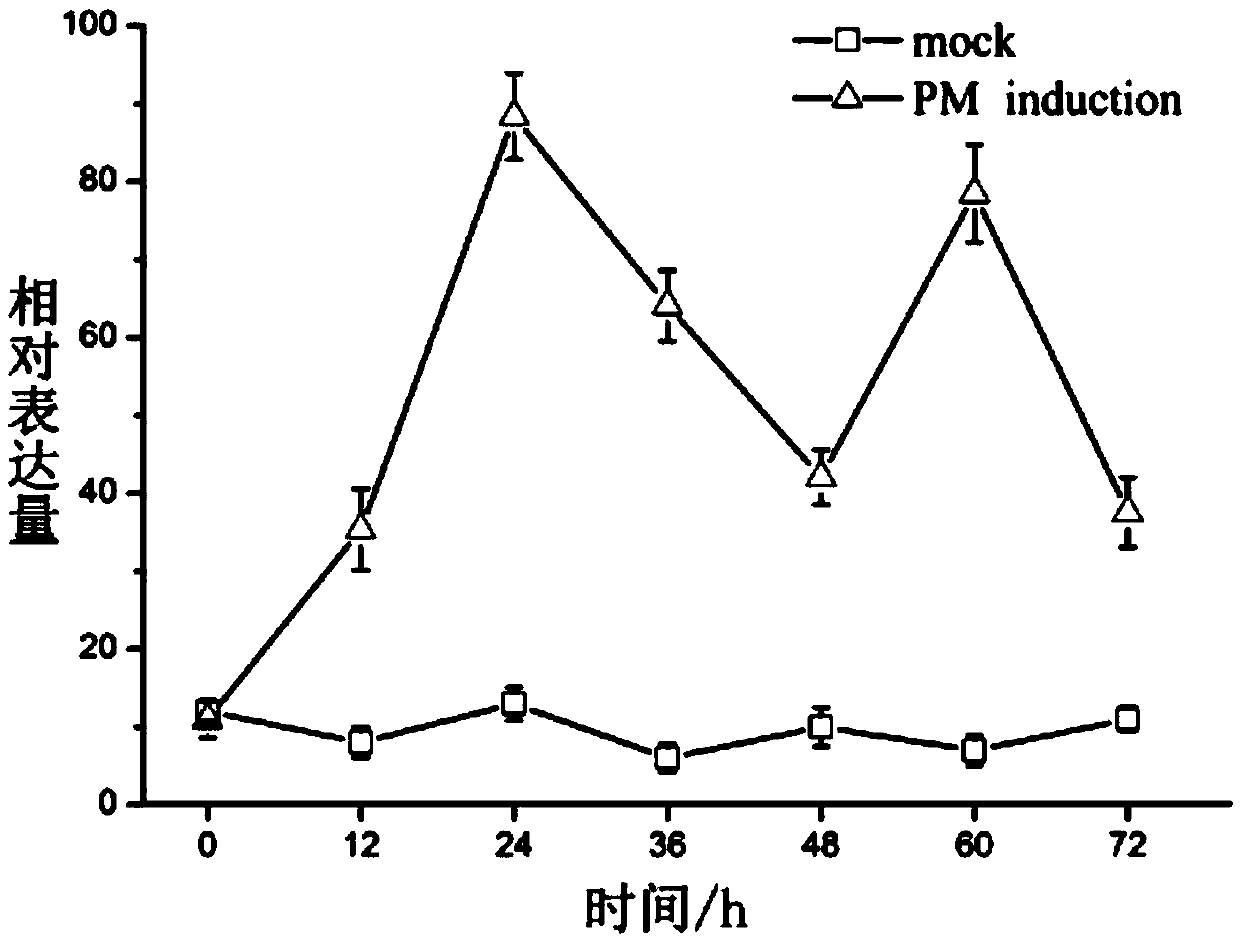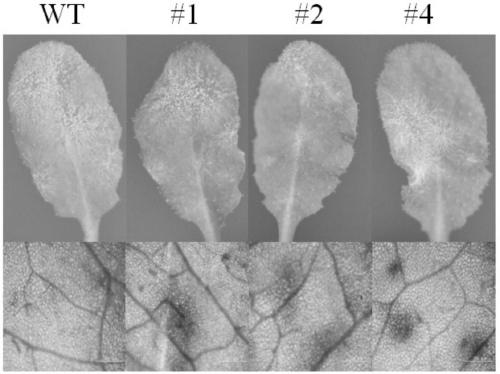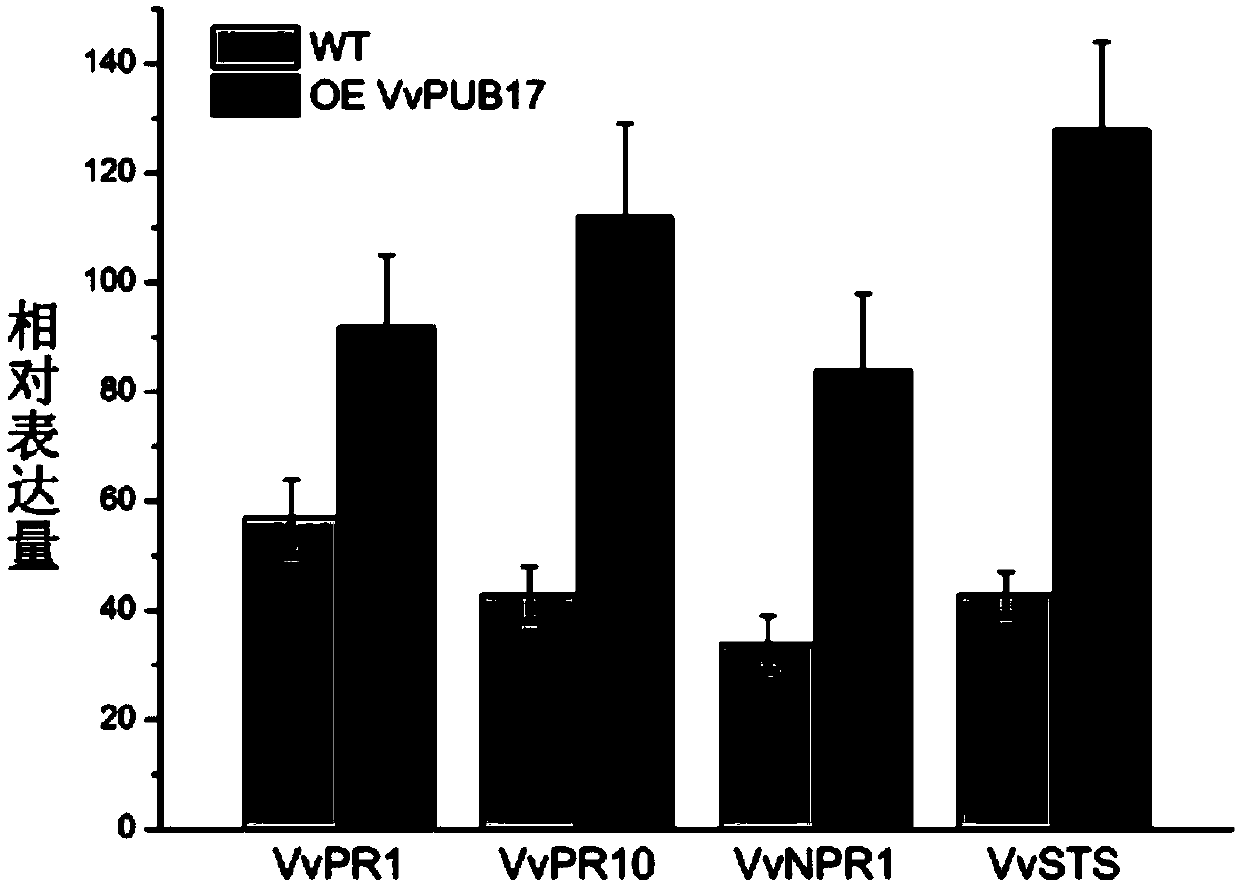Grape disease resistance related gene vvpub21 and its plant expression vector and application
A disease-resistance-related gene and expression vector technology, which is applied in the field of expression vectors containing VvPUB21 gene, can solve the problem that the role of ubiquitin ligase gene is not very clear, and achieves overcoming the transfer of disease-resistance-related genes, avoiding losses, and improving resistance. Effect
- Summary
- Abstract
- Description
- Claims
- Application Information
AI Technical Summary
Problems solved by technology
Method used
Image
Examples
Embodiment 1
[0027] Isolation and cloning of grape disease resistance-related gene VvPUB21, the specific method is as follows:
[0028] 1) The total RNA of grape leaves was extracted by SDS / phenol method, and the operation was as follows:
[0029] Prepare extraction solution: Add 850 μL extraction buffer (140 mM LiCl, 10 mM EDTA, 10 mM Tris, 5% (w / v) SDS, 2% (w / v) PVP) and 30 μL β-mercaptoethanol to a 2.0 mL centrifuge tube, fully Mix well and set aside.
[0030] Use liquid nitrogen to pre-cool the mortar, take 0.2g of young grape leaves in the mortar, add an appropriate amount of liquid nitrogen to fully grind, then pack into 2.0mL centrifuge tubes containing the pre-prepared extract, vortex and mix well, 4 Centrifuge at 12000rpm for 5min at ℃; transfer the supernatant to another 2.0mL centrifuge tube, add an equal volume of chloroform-isoamyl alcohol (24:1), vortex and mix well, and centrifuge at 12000rpm at 4℃ for 15min; draw Transfer the supernatant to another 2.0mL centrifuge tube, ...
Embodiment 2
[0042] The construction of the overexpression vector of the grape disease resistance-related gene VvPUB21 is as follows:
[0043] Grape leaf cDNA was used as a template, and P1 and P2 were used as primers. The underlined part of P1 was the enzyme cutting site Bgl II, and the underlined area of P2 was the enzyme cutting site BstE II. The VvPUB21 gene fragment was amplified by PCR and connected to the pMD19-T vector; the ligation reaction system was: 0.5 μL of pMD19-T vector, 2.5 μL of Solution I, 2.0 μL of the target fragment, mixed well, and reacted at 16°C for 2 hours; The ligation product was transformed into TOP10 competent cells, and the blue-white spot screening was carried out on the LB medium with Amp added, and the positive clones were picked and inoculated into the LB liquid medium for shaking culture, and the plasmid was extracted to obtain the positive plasmid pMD19-T-VvPUB21, which was sent to the company for sequencing detection . Carry out double enzyme digest...
Embodiment 3
[0048] The plant overexpression vector pCAMBIA3301-VvPUB21 is transformed into Agrobacterium, the specific method is as follows:
[0049] Place the electric shock cup under ultraviolet light for 20 minutes; take out the competent cells of Agrobacterium GV3101, put them on ice to melt, transfer to the electric shock cup after melting, add 10 μL of plasmid, mix well, and place on ice for 5 minutes; transfer to the electric shock cup Transfer to an electric shock apparatus for electric shock treatment; after treatment, take out the transformation liquid in the electric shock cup into a 1.5mL centrifuge tube, add 1mL LB medium, and incubate at 28°C for 1h; centrifuge briefly in a centrifuge for 15s, and remove part of the supernatant solution, suspended and coated on a plate containing antibiotics (60 mg / L gentamycin, 100 mg / L kanamycin), and cultured at 28°C. Pick a single clone and inoculate it into liquid LB medium with antibiotics (60mg / L gentamycin, 100mg / L kanamycin), cultur...
PUM
 Login to View More
Login to View More Abstract
Description
Claims
Application Information
 Login to View More
Login to View More - R&D
- Intellectual Property
- Life Sciences
- Materials
- Tech Scout
- Unparalleled Data Quality
- Higher Quality Content
- 60% Fewer Hallucinations
Browse by: Latest US Patents, China's latest patents, Technical Efficacy Thesaurus, Application Domain, Technology Topic, Popular Technical Reports.
© 2025 PatSnap. All rights reserved.Legal|Privacy policy|Modern Slavery Act Transparency Statement|Sitemap|About US| Contact US: help@patsnap.com



